The Best Supplements for Chronic Stress, Say Dietitians
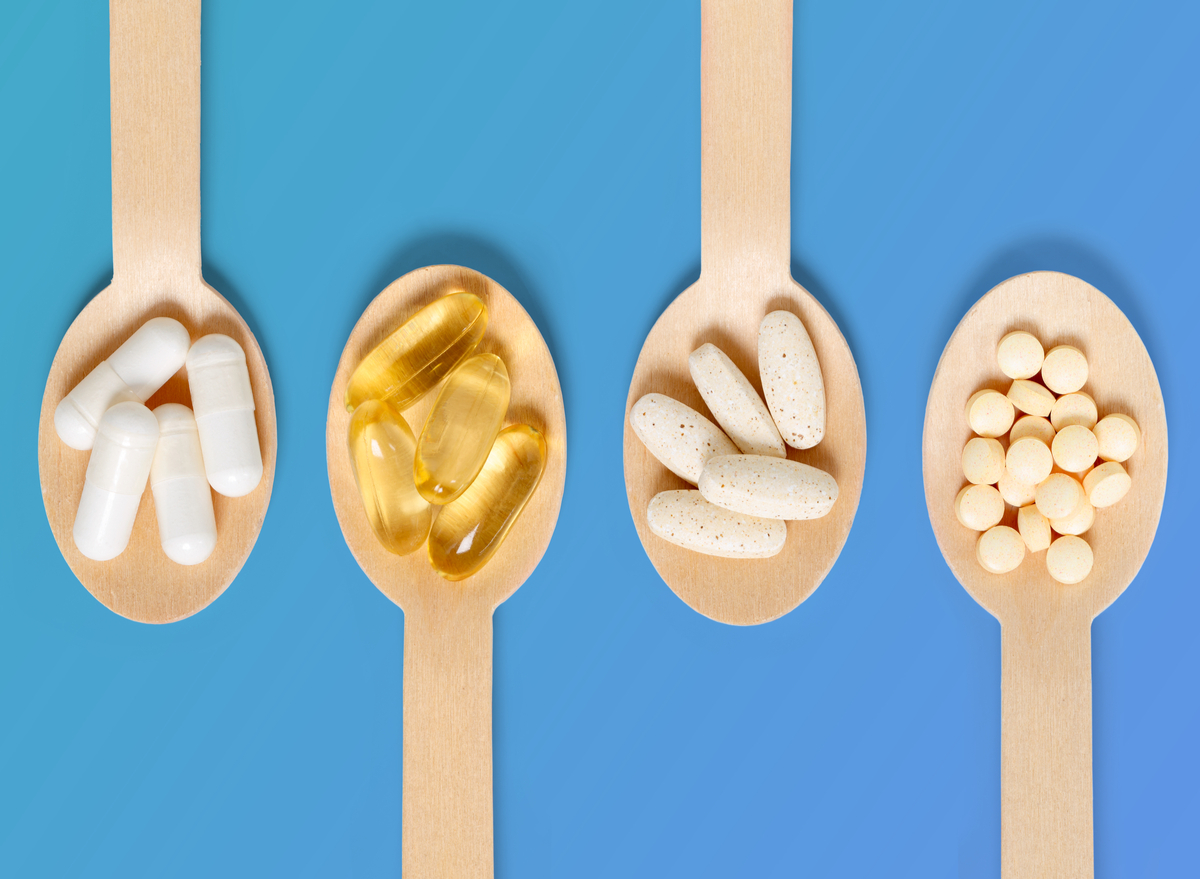
Everyone gets stressed out from time to time. Whether due to a particularly hectic day at work, an unexpected expense, or even a scary movie, your sympathetic nervous system responds to these events with a release of adrenaline and cortisol.
Stress is perfectly safe in small doses. Your body is designed with a built-in switch: the parasympathetic nervous system, which triggers the baseline “rest and digest” response. This kicks in after an acute stress event is over and downregulates your nervous system to re-establish the body’s state of relaxation, according to the American Psychological Association (APA).
When cortisol is regularly running high and the parasympathetic system doesn’t have a chance to take over is when stress turns chronic. Living with a heightened sense of anxiety, worry, or exhaustion can not only be emotionally draining, but it also can lead to many physical symptoms—headaches, insomnia, rapid heart rate, gastrointestinal problems, and high blood pressure, just to name a few—that take a toll on your overall well-being.
One year into the COVID-19 pandemic, the APA released a report that found that “84% of adults reported feeling at least one emotion associated with prolonged stress” over a two-week period.
So if you’re finding yourself feeling overwhelmed more often than not, you’re not alone. Fortunately, there are ways to address chronic stress.
“If you are someone under mild to moderate chronic stress, depression, and anxiety, there’s really a lot you can do in terms of diet and nutrition to offset those effects,” say, Tammy Lakatos Shames, RDN, CDN, CFT, and Lyssie Lakatos, RDN, CDN, CFT, also known as The Nutrition Twins.
Many well-known self-care habits can help you lower your stress levels, but it never hurts to come at it from a different angle—like with supplementation. We consulted medical expert board members, The Nutrition Twins and Sydney Greene, MS, RD, for their expertise on ways that supplements can address underlying, ongoing stress. Read on, and for more on how to eat healthy, don’t miss The #1 Best Juice to Drink Every Day, Says Science.
Magnesium
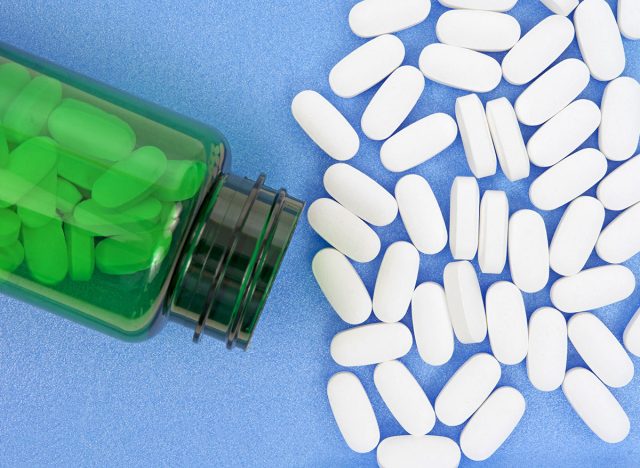
There is an inverse relationship between higher stress and lower magnesium levels, so it may be possible to address your chronic stress with magnesium supplements. One 2017 study showed that magnesium supplementation has positive effects on subjective anxiety levels in individuals who are more vulnerable to anxious feelings.
“Magnesium is required for more than 300 enzymes to function properly in the body. Unfortunately, about half of Americans are deficient in magnesium,” says Greene. “Inadequate intake of magnesium can be linked to high blood pressure, poor digestion, and poor stress resilience. Many of the symptoms related to chronic stress (fatigue, irritability, muscle tension, headaches) can also be seen with magnesium deficiency.”
So consider taking a magnesium supplement to ease the physical symptoms of long-standing stress, or add these magnesium-rich foods to your diet to get the recommended daily amount (400-420 milligrams for men and 310-320 milligrams for women).
L-Theanine
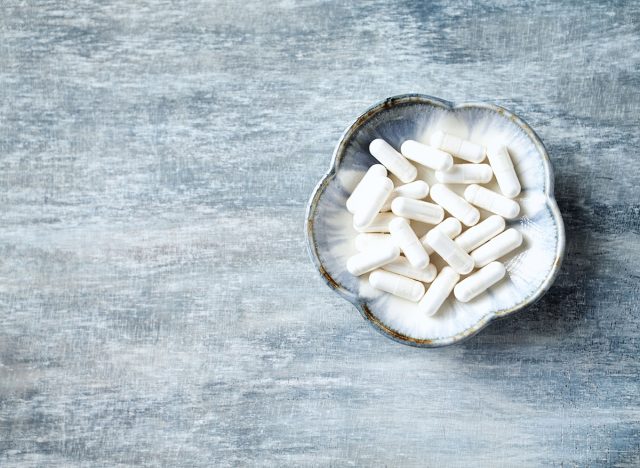
Found in black, white, oolong, and green teas, L-theanine is a compound that enhances the production of dopamine and serotonin, which are your brain’s “feel-good” chemicals, according to The Nutrition Twins. “It gives you mental calmness while still promoting alertness by positively impacting neurotransmitters that are involved in sleep, mood, and stress.”
It also helps the brain to produce GABA, a neurotransmitter that lowers nervous system activity.
L-theanine was found in a 2008 study to enhance brain activity in the alpha frequency, which is associated with brain relaxation, without induced drowsiness. The effects occurred at a dosage of 50 milligrams, with the most impact demonstrated for those with high levels of stress.
Drinking two cups of green tea can help you start to see benefits, although The Nutrition Twins advise opting for the supplement version over the tea if you’re taking it to wind down before bed since tea contains caffeine.
However, consult a doctor if you’re also taking medications for blood pressure or hypertension or are on blood thinners, as L-theanine can lower blood pressure or pose an additional risk of bleeding.
READ MORE: Secret Effects of Drinking Green Tea, Says Science
Curcumin
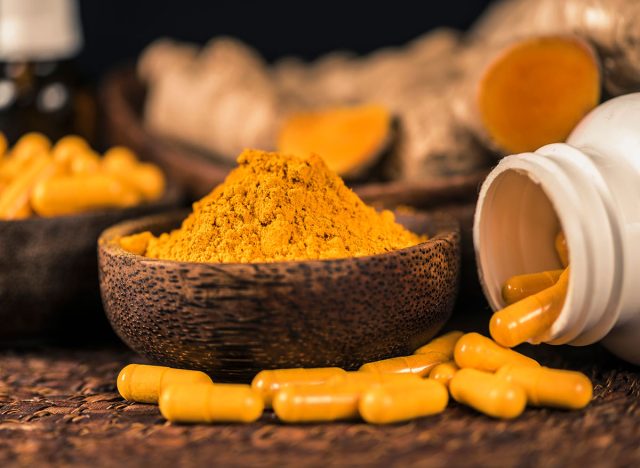
Prolonged periods of stress can contribute to inflammation, which leads to some serious health risks. Curcumin is one possible remedy. According to Greene, it’s the polyphenol found in turmeric root, and it has been widely studied for its antioxidant and anti-inflammatory properties. “When the body is under long-term stress, adding turmeric to recipes, smoothies, or taking a turmeric supplement can help prevent damage from inflammation,” advises Greene.
Taking a high-quality supplement to reduce inflammation and provide other health benefits can be a good way to repair damage from stress. Just be mindful of the amount—eating too much turmeric can come with its own risks.
Omega-3s
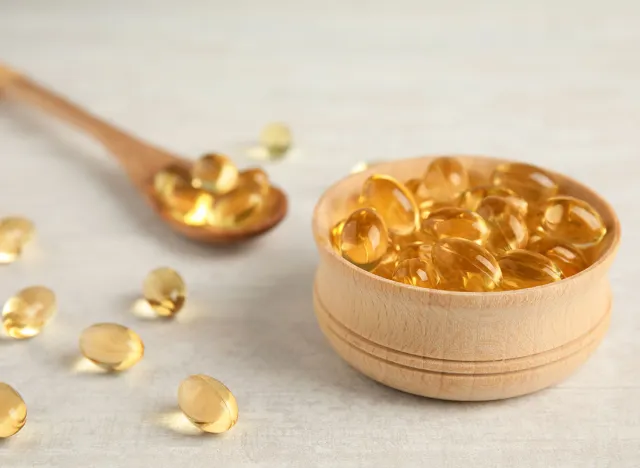
Omega-3 essential fatty acids contain compounds that reduce inflammation in the body, lowering the risk of chronic diseases. It has also been shown to help reduce the long-term effects of both anxiety and depression, say The Nutrition Twins.
“They affect the physiological and physical effects of stress because they cross the brain-blood barrier, and they have anti-inflammatory properties that can help relieve depression,” say The Nutrition Twins.
Studies have found that supplementing with high levels of eicosapentaenoic acid (EPA), one form of omega-3, resulted in noticeable improvements for individuals with depression.
People taking the highest doses (up to 2,000 milligrams) have the most reduction in symptoms of anxiety.
The best way to get omega-3s is through diet. Eating three ounces of fatty fish—herring, salmon, sardines, and whitefish are all good options—two to three times per week will get you to the recommended amount. If you want a higher dosage (200 to 2,200 milligrams) to combat low-level anxiety and depression, you may benefit from a high-quality daily supplement.
READ MORE: The #1 Best Omega-3 Supplement to Take, Says Dietitian
One risk of fish oil or omega-3 supplements is their ability to inhibit clot formation, which increases bleeding. Talk to a medical professional first if you have low blood pressure, are on blood thinners, or are preparing for surgery.
Ashwagandha
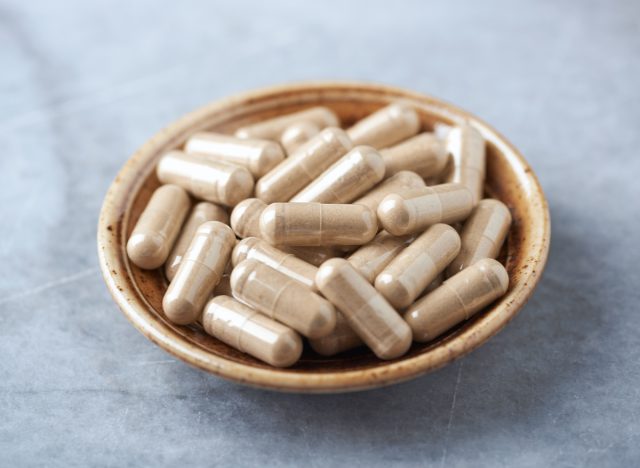
“Ashwagandha has received a lot of hype for its supposed ability to mitigate stress,” says Greene. “An adaptogen, ashwagandha adapts to your body’s nervous system and it can support the body’s resiliency to a stress response.”
There have been several studies over the years measuring the effects of ashwagandha on anxiety and stress. In 2019, one randomized, double-blind study measured the cortisol and other hormone levels of self-reported high-stress individuals before and after taking 240 milligrams of ashwagandha extract daily. Compared to the placebo group, they found significant reductions in both self-reported and measured stress markers.
Before you self-prescribe your own daily dose of this adaptogen, consult a medical expert. “An important note about ashwagandha is that, in some, it can increase levels of anxiety,” warns Greene. “It is always important to check with your doctor before taking a new supplement, and if you are on prescription medications, you should check for interactions.”









